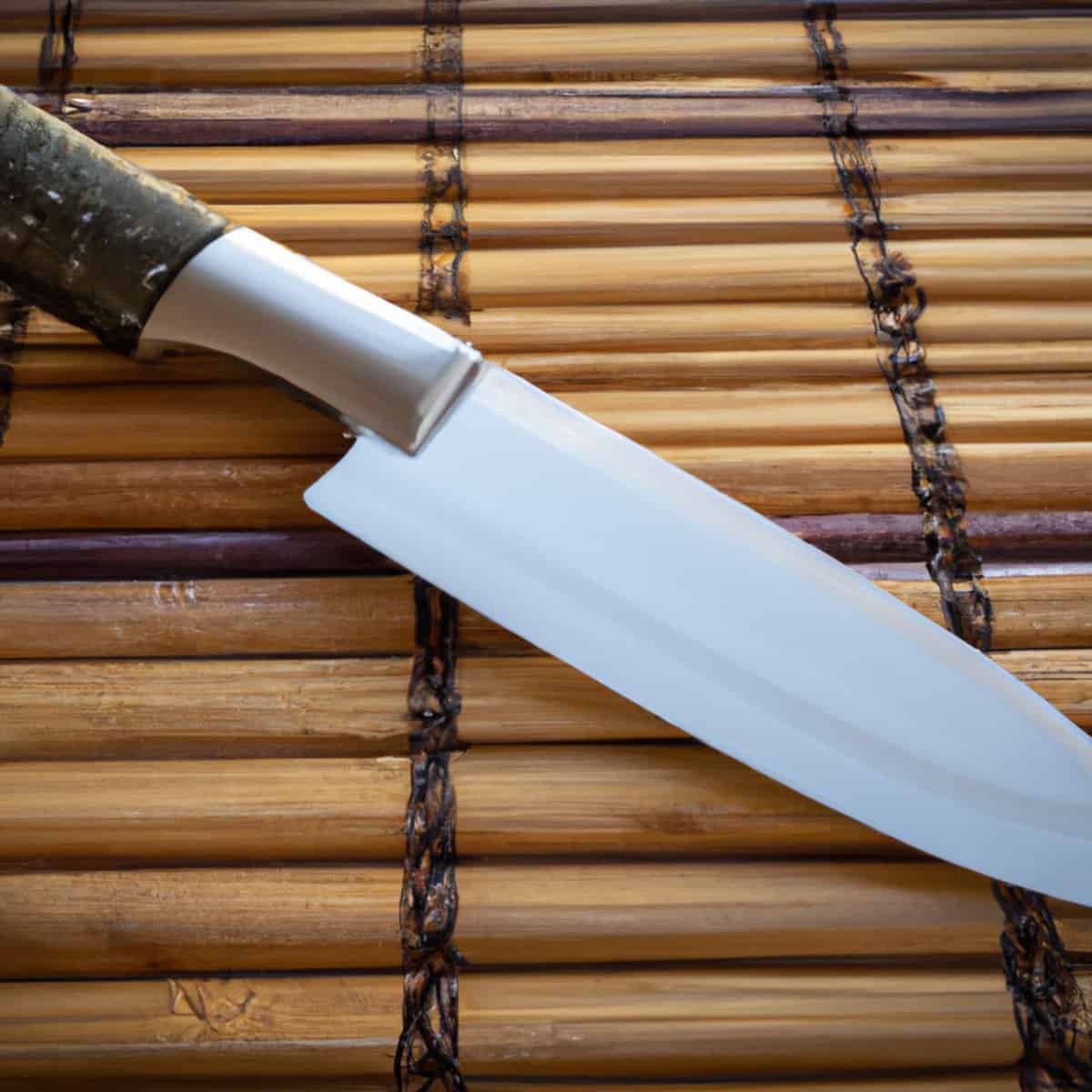How Long Can Japanese Knives Last? More Than a Lifetime With Proper Care
You might be thinking about buying a sharp Japanese knife for your kitchen. The buying price can seem like a real investment.
So, have you ever wondered how long Japanese knives last?
Japanese knives are renowned for their quality, sharpness, and durability. But how long do they actually last?

The answer depends on a variety of factors, including the type of knife, the materials used to make it, and how well you take care of it.
Generally speaking, Japanese knives can last anywhere from several years to decades with proper maintenance. Higher-end models made with higher-grade steel tend to stay sharp longer and retain their edge over time. With regular cleaning and sharpening, these knives can be passed down through generations as cherished family heirlooms!
Read on to find out how long Japanese knives can last and how to ensure yours lasts as long as possible!

Check out our new cookbook
Bitemybun's family recipes with complete meal planner and recipe guide.
Try it out for free with Kindle Unlimited:
Read for freeIn this post we'll cover:
How long do Japanese knives last?
Japanese knives are renowned for their quality and durability so they can last a long time.
Some chefs have owned Shun or Tojiro knives for over 30 years and still use them to prepare delicious meals.
If you compare Western knives and Japanese knives, the general consensus is that Western knives are more heavy-duty and have a longer lifespan.
This is kind of true, but with proper maintenance, Japanese knives can also last you a very long time.
Generally, they can last up to 10 years or more with proper knife care and maintenance.
However, the lifespan of a Japanese knife will depend on the type of knife, how it’s used, and how it’s maintained.
Most high-quality Japanese knives can actually last way more than 10 years – in fact, many can last a lifetime as long as they’re properly cared for.
Regularly sharpening Japanese knives with whetstones can ensure your knife is always usable and in good condition.
As well, using the correct cutting board and storing them properly can help extend their life.
For instance, a high-end Japanese knife made from high-quality steel will last longer than a cheaper one made from lower-quality steel.
Additionally, if the knife is used for cutting hard materials like bone, it will wear down faster than if it’s used for softer materials.
Factors that determine how long Japanese knives last
Here’s what can make a difference in how long your Japanese knife will last:
Quality of the knife
The quality of the knife is the most important factor in determining how long it will last.
Generally, higher-quality knives will last longer than lower quality knives.
Japanese knives are known for their high quality and durability, so they can last for many years with proper care and maintenance.
Some popular Japanese knife manufacturers include Shun, Tojiro, Masamoto, and Sakai.
Knives from these brands can last many more years than Kamikoto which although a Japanese brand, doesn’t manufacture its knives there.
Beware of fake Japanese knives which are just cheap knockoffs – these can break within months and are poor quality.
Care and maintenance
Proper care and maintenance are essential for extending the life of a Japanese knife.
Regular sharpening, cleaning, and oiling will help keep the blade in good condition and prevent rust and corrosion.
It’s also important to store the knife in a dry place and avoid using it on hard surfaces.
Usage
How often the knife is used and for what purpose will also affect its longevity.
If the knife is used for cutting food, it will likely last longer than if it is used for more demanding tasks such as butchering.
Also, how the knife is used is also very important. If the knives are not used with the proper Japanese knife skills, they can get damaged.
Then finally, consider which knife you use for which task.
A Yanagiba, for example, is a long thin blade knife used for cutting and slicing fish for sushi and sashimi.
If you decide to use it as a bread knife, it will clearly break and not last long.
Environment
The environment in which the knife is used can also have an impact on its lifespan.
If the knife is exposed to moisture or extreme temperatures, it can cause the blade to corrode or rust.
It’s important to store the knife in a dry place and avoid using it in wet or humid environments.
Which Japanese steel is the most durable?
An important factor to consider is the steel that the knife is made of.
Some of the best Japanese knives are made of high-carbon steel so let’s take a look at which steel is best if you want a long-lasting knife.
High-carbon steel knives will generally last longer than stainless steel knives.
High-carbon blades can retain a sharper edge for much longer, and they are also more resistant to corrosion and rust.
Some of the most popular high-carbon steels for Japanese knives include Aogami, Shirogami, Blue Super, White Steel, and VG-10.
High-carbon steel can last for several years with proper maintenance, but it will eventually need to be sharpened more frequently.
For this reason, many chefs and cooks prefer stainless steel knives, which are easier to maintain but don’t hold an edge as well.
In conclusion, Japanese knives can last up to 10 years or more with proper care and maintenance.
However, the lifespan of a Japanese knife will depend on the type of knife, how it’s used, and how it’s maintained.
Learn more about the differences between special aogami (blue) and shirogami (white) steel
How to extend the life of a Japanese knife
Japanese knife care involves regular cleaning, sharpening, oiling, and proper storage.
There are 4 essential things to consider if you want your Japanese knives to last a long time:
Japanese knives must be housed in a knife sheath, knife strip, or knife block to maintain their sharpness and perform at their peak.
To avoid rusting, they must also be hand-washed and well-dried after every usage and oiled once in a while.
Still ended up with a rusted Japanese knife? Not all is lost! Here is how to clean and restore a rusted knife
Handwashing
Japanese knives should always be hand washed.
Don’t wash them in the dishwasher, as the hot water and detergents can ruin the blade.
Also, be sure to use a gentle sponge or brush when washing your knives so you don’t damage them.
Sharpen them regularly
Use a whetstone to make your knife razor-sharp.
A whetstone is used to sharpen and hone knives, and it should be used regularly to keep your Japanese knives in top condition.
There are various grits depending on how smooth you want the knife.
You can also use a sharpening jig if you want to be very professional about sharpening your knives.
Fix chips and breaks regularly using coarse whetstones, and then polish and sharpen the knife again, so it’s razor-sharp.
Oil the knife
Japanese knives should be oiled after each sharpening, preferably with a food-safe oil such as mineral or olive oil.
This helps to protect the steel from rust and corrosion, which can significantly reduce the lifespan of your knives.
Oiling should be done every 3-4 months or when the blade starts to feel dry.
Store knives properly
There are several great Japanese knife storage solutions out there that ensure your blade doesn’t get damaged while in storage.
The best way to store a Japanese knife is to use a magnetic knife strip since this keeps the blade away from other knives and any possible moisture.
This will also help keep your knife free of scratches and dents, which can significantly reduce its lifespan.
Wooden knife blocks are also a good solution and quite affordable. They keep the knives separated.
Magnetic knife blocks are probably even better though because you don’t have to keep putting the knife and pull it out, which can scratch the blade.
Finally, a Japanese knife tower is an option if you have a small collection of only a few knives and don’t mind displaying them.
FAQs
Are Japanese knives durable?
Yes, Japanese knives are very durable. They are made from high-quality materials that are designed to last for years.
The blades are usually made from stainless steel or carbon steel, which are both very strong and resistant to corrosion.
Additionally, the handles are often made from hardwood or plastic, which are also very durable.
Are hand-forged Japanese knives durable?
Hand-forged Japanese knives are made with higher quality materials and craftsmanship than their factory-made counterparts, so they tend to be more durable and long-lasting.
These knives are often made with high carbon or stainless steel, heat treated to the perfect hardness, and forged by hand to create a unique blade geometry.
Because of the extra attention to detail and quality, hand-forged Japanese knives can last for decades with proper care.
They may be more expensive than factory-made knives, but they offer superior performance and are an excellent investment for serious chefs.
Do Japanese knives require more maintenance?
Yes, Japanese knives require more maintenance than other types of knives. This is because they are made from harder materials, which require more frequent sharpening.
Additionally, the blades are more prone to rust and corrosion, so they need to be cleaned and oiled regularly.
How often do you sharpen Japanese knives?
It depends on how often you use them. If you use them frequently, you should sharpen them every few weeks.
If you use them less often, you can sharpen them every few months. Additionally, you should sharpen them whenever the blades start to feel dull.
Conclusion
Overall, Japanese knives are a great choice for anyone looking for a reliable and long-lasting kitchen knife.
It’s true most people claim Western knives last longer than Japanese knives.
And although that’s generally true, Japanese knives can perform better and still last for decades.
With proper care and maintenance, they can last a lifetime.
Be sure to clean and dry your knives after each use, store them safely, and sharpen them regularly to keep them in top condition.
With these tips, you’ll surely enjoy your Japanese knives for many years to come!
Looking for the one knife to rule them all? You are looking for the kiritsuke all-purpose chef’s knife
Check out our new cookbook
Bitemybun's family recipes with complete meal planner and recipe guide.
Try it out for free with Kindle Unlimited:
Read for freeJoost Nusselder, the founder of Bite My Bun is a content marketer, dad and loves trying out new food with Japanese food at the heart of his passion, and together with his team he's been creating in-depth blog articles since 2016 to help loyal readers with recipes and cooking tips.
